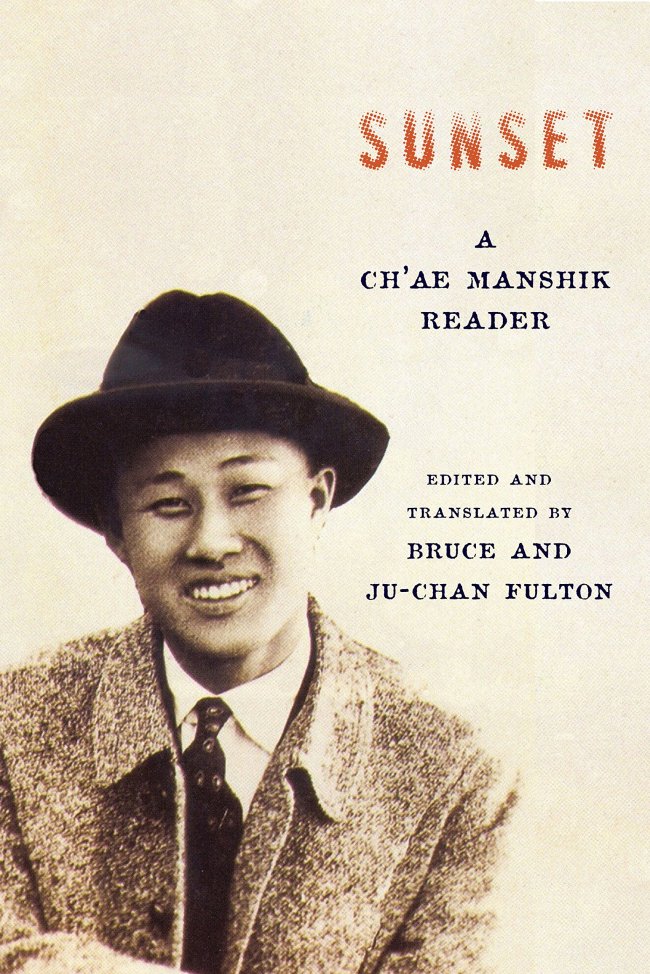Chae Man-shik was a prolific Korean novelist, playwright, literary critic, journalist and essayist who boldly confronted society’s pretensions and predicaments under the restrictions of Japan’s colonial occupation using satire.
Born in 1902 in Okgu, present-day Gunsan, North Jeolla Province, Chae lived true to his calling as a public intellectual, practicing his “publish-or-perish” ethos until succumbing to tuberculosis in 1950. In a span of about 25 years he produced some 290 novels, tales, plays, critiques and essays that exposed the inner contradictions of class, colonialism, national identity and the intelligentsia, from which he was not free.
A book has been published featuring a wide spectrum of the author’s works, covering novellas, short fiction, book reviews, anecdotal essays, travel writings, a children’s story, a one-act and three-act play and roundtable discussions.
“Sunset: A Chae Manshik Reader,” edited and translated into English by Bruce and Ju-Chan Fulton, professional translators of numerous modern Korean fictional works, is a rich anthology of Chae’s innovative, era-defining writings, drawing on the 10-volume anthology “Chae Man-shik Complete Works” (1989). The edition, published by the Columbia University Press, also has an introduction outlining the limitations of existing approaches to Chae.
“Readable and extending well beyond Chae Man-shik’s more familiar works, ‘Sunset’ embraces the sheer diversity of this major author’s oeuvre without shying away from critical questions raised by his literary practice and politics in both the colonial and post-liberation contexts,” wrote Christopher P. Hanscom, author of “The Real Modern: Literary Modernism and the Crisis of Representation in Colonial Korea.”
 |
“Sunset: A Chae Manshik Reader” (Columbia University Press) |
“Spanning genres and literary modes, the volume mirrors the imaginative scope and intertextuality of Chae’s writing and will be of great interest in the classroom and for the general reader of modern literature alike.”
The book contextualizes the anthology’s contents both in terms of the author’s career and the rich Korean tradition of intertextuality and intermediality, according to the Columbia University Press.
Lee Jin-kyung, professor at the University of California, San Diego, wrote, “The 18 works in ‘Sunset,’ published between 1924 and 1960, give us an extraordinary insight into various aspects of the Korean peninsula’s modernity, through Chae’s signature style that vaunts darkly humorous and penetrating critique of all things and every viewpoint.”
The selection of 18 works include “Sunset” (1948), “Skewered Beef” (1929), “Challenges Facing Today’s Writers” (1937), “Yujong and I” (1937), “Juvesenility” (1938), “A Three-way Conversation on National Literature” (1941) and “Angel for a Day” (1960), among others.
Chae entered the literary world in 1924 with a short story titled “Toward the Three Paths,” and attracted nationwide attention 10 years later with the publication of “A Ready-Made Life.” Educated at Waseda University and working as a journalist at Dong-A Ilbo and Chosun Ilbo as well as an editor of Gaebyeok Publishing Company’s magazines, he switched to creative writing full-time in 1936 upon moving to Kaesong, North Korea.
Since the early 1930s, he began to focus his attention on the plight of intellectuals under the colonial oppression, a subject matter he continued to pursue in works like “An Intellectual and Mung-bean Cake” and “My Innocent Uncle.” Similar to his contemporaries, Chae was not free from the influence of Japanese colonialism, which infiltrated every aspect of Korean life at the time. He has been criticized for having produced works that exalted the imperial government while turning a blind eye to its transgressions.
Arrested by the colonial government in 1938 for his affiliations with Dokseohoe, or Society for Reading, Chae was released on the condition that he participate in the pro-Japanese literary organization Korean Literary Society for Patriotism, a stipulation he duly complied with after his release.
“Anecdotal evidence suggests that not a few among the privileged were outwardly model colonial subjects while secretly supporting the Korean provisional government in Shanghai and more active forms of resistance against the Japanese,” wrote the book’s authors in the introduction.
“Outwardly Chae paid lip service to the demands of total mobilization for the Japanese empire during the war years,” they wrote, while inside Chae felt “neither clever nor courageous ... as one of that class of mediocre, bungling, submissive men, but deep down inside that’s not how I wanted it to be.”
After 1945 and under a liberal environment, Chae resumed his sharp social critique, now turning his attention to the previously forced compromise with the Japanese imperialists, including his own. His 1948 novel “Sinner of the Nation” fictionally centered on his own life, illuminates the difficult choices faced by Korean journalists and intellectuals under Japanese occupation, and tacitly argues the merit of judging their roles from a historical perspective.
Chae’s works from 1945 until his death provide a rare glimpse of upheavals taking place in the peninsula before the ideology-driven 1950-53 Korean War. Unlike many writers’ works that were banned in South Korea for their leftist views until the democratization of the late 1980s, Chae remained “ideologically aloof” in the 1945-48 period of literary production that was unconstrained by state ideology, according to the book’s translators.
By Joel Lee (
joel@heraldcorp.com)





![[Exclusive] Hyundai Mobis eyes closer ties with BYD](http://res.heraldm.com/phpwas/restmb_idxmake.php?idx=644&simg=/content/image/2024/11/25/20241125050044_0.jpg)
![[Herald Review] 'Gangnam B-Side' combines social realism with masterful suspense, performance](http://res.heraldm.com/phpwas/restmb_idxmake.php?idx=644&simg=/content/image/2024/11/25/20241125050072_0.jpg)

